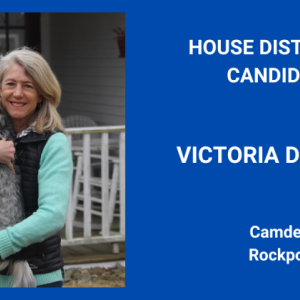On the issues: House District 41 candidate Victoria Doudera
Penobscot Bay Pilot has posed questions to each candidate running for Maine State Legislature, providing the opportunity for the public to better understand their position on issues important to the state. Candidates responding with their individual written answers will have their responses stored in the Pilot’s 2022 Election Resource Guide.
Victoria Doudera, a member of the Democratic Party, is seeking election to represent Maine House District 41, which includes Camden and Rockport.
Please provide a concise biography of yourself, and state why you are running for political office.
I grew up in rural New England and came to Camden in my early 20’s with my future husband, Ed, and the dream of starting a business. We had very little money but found a run-down Victorian on Route 1, so we worked like crazy fixing it up, and opened the Blackberry Inn that June.
Early on, I immersed myself in our community. I served as a First Responder for Camden First Aid, joined the board of the Camden Shakespeare Company, and became active in our Chamber of Commerce, serving twice as board Vice President. After we sold the inn I wrote my first book, Moving to Maine, a guide to welcome newcomers to the state.
Our three kids, now grown, were born in Rockport and went to Camden-Rockport schools. Two of them have “come back” to live in Maine; the other lives happily with his wife in Vermont. Besides my children, one of my proudest accomplishments is serving as President of Midcoast Habitat for Humanity for five years, an important time of reinvention for the organization in which we hired our first executive director, bought our Rockport barn, opened the ReStore, and greatly ramped up our building program to help as many Knox County families as possible.
I’ve served two terms in the Legislature and view it as a way of using my communication skills, life experience and energy to give back to our community. It's a job that I take seriously, involving listening to my constituents; responding in a timely manner; problem solving; and bringing forward bill ideas that will improve lives. I don’t have all the answers, but I know how to research an issue, contact community members with expertise, and find out who in state government can provide information.
I’m proud of the many times I’ve helped Camden and Rockport residents connect to needed services, smooth a business snag, or get the recognition they deserve statewide. I’m grateful for the many conversations I have had within our towns that have led to my submitting and championing legislation that makes Maine a better place to live and raise a family. Safer homes for children; cruelty-free cosmetics; fewer “forever” chemicals; and streamlined online notarization are just a few of your ideas that I drafted and worked with my colleagues to pass, and are now chaptered law.
Serving as your voice in Augusta is an honor, and I look forward to continuing as your Representative.
What are the three most pressing issues facing Maine, as a state, today, and how would you like to see them resolved?
Along with other states, we are experiencing a workforce shortage, a crisis of both availability and skills level. We must continue to increase our skilled trade and apprenticeship programs, as well as work to more fully engage new Mainers, asylum seekers, and older Mainers in the workforce.
Healthcare affordability continues to be a huge problem — and a huge source of stress — for Mainers. While more folks than ever are insured, thanks to the Affordable Care Act, many are underinsured, with high deductibles that mean that for all intents and purposes their insurance comes into play only with a catastrophe. Addressing the high "facility fees" that are surprising Maine patients is something we need to tackle for sure. Last session we made real progress, increasing eligibility for children and pregnant women and expanding dental coverage. We made it cheaper and easier to get insurance on the individual market and improved prescription affordability. The recently passed Inflation Reduction Act contains several health provisions which will also result in savings for Mainers. Lower prescription drug prices and limits on what pharmaceutical companies can charge for some medications (like insulin) will also be a big help.
Another pressing issue that has definitely affected our district is that we are suffering from an acute housing shortage — see the next two questions — and a shortage of behavioral health care services. The issue of mental health (especially among children) and substance abuse has only worsened since the pandemic and we must make behavioral healthcare more of a priority for state spending.
Maine is grappling with a housing shortage, and legislation has been crafted — and passed last year — at the Maine Legislature to try and ease the situation by allowing greater density in all municipalities. Those municipalities now are analyzing this new state rule to understand how it applies to local zoning ordinances. Do you think this was an appropriate law to pass?
Yes. This law aims to increase our housing stock by giving property owners the ability to add accessory dwelling units and other measures and is one tool to combat Maine’s growing housing crisis. Current data from realtor.com shows that the median price of a single-family home in Knox County is now $425,000 — a record high — and a 26% jump from last year when the median price was $337,500. Today 66% of Knox County residents are unable to afford a home at the median price. That’s our friends and neighbors, our nurses and teachers, our bank tellers and boomeranging young adults.
We are experiencing a housing crisis — not just a low income housing problem, but a workforce housing problem; a first-time homebuyer problem; a downsizing senior citizen problem. As a Realtor, legislator, and Midcoast Habitat board member, this issue is front and center for me. The new state rule you mention — LD 2003 — was supported by a wide swathe of Mainers, including the business community, environmental community and many town planners. It gives property owners more rights as to what they can do with their single family home and is a bold, creative step in helping to create more housing availability.
Do you have other ideas, and proposals, to help ease the housing problem?
Yes. I’d like to see incentives for owners of investment properties who choose to offer long-term property rentals that provide stability for Maine families, rather than the (perhaps more lucrative) short-term vacation rentals. More development of energy-efficient homes and some real soul-searching around the paradox whereby we state that we need housing, we KNOW that we need housing, and yet can’t seem to bring ourselves to support the creation of it in our own town or neighborhood.
What legislative committees would you like to serve on and why?
I currently serve on the Environment and Natural Resources Committee and am the Maine State Lead for the National Caucus of Environmental Legislators, as well as a new appointment to the Maine Climate Council, so I believe I would like to continue in this vein, especially given the additional attention issues like forever chemicals (such as PFAS) plastic pollution, solid waste reduction and river restoration will demand next session. That said, I will knuckle down and work on any committee where I am needed and asked to serve.
Maine’s economy relies on small and micro-businesses. How will you help the entrepreneur succeed in this state?
As someone who has started two Maine businesses, run another, and in my capacity as a realtor helped many others get off the ground, I am familiar with the challenges to entrepreneurs in this state. Continuing to improve the state’s infrastructure is key — not just bridges, roads, and ferries — but our digital infrastructure. There are still a great number of households and businesses in Maine who do not have access to high-speed broadband, and three-quarters of households do not have a choice of providers. That’s crippling us – because no matter what business you are in today, whether you are a family farm raising free-range chickens or a team of architects designing houses, you need to be able to compete on the world stage. And in a post-pandemic world, we need reliable internet service for tele-health, remote schooling, and all of the Zoom meetings we are now accustomed to!
When it comes to starting businesses here, Gov. Mills and Commissioner Heather Johnson (Dept. of Economic & Community Development) have really worked to streamline the bureaucracy and consolidate some of the state agencies to make it easier for people with great ideas to get them going. Of course the pandemic was a huge test of our resiliency, and while many businesses weathered it successfully thanks to aid and grants, others are still recuperating.
Going forward, we need to help small businesses with the tools they need to get off the ground and achieve success: child care, reliable Internet, affordable clean energy, more workers and reasonably priced health care.
What are the greatest economic, cultural and social strengths in your district, and how will you support them?
Camden and Rockport are blessed with beautiful harbors, vibrant downtowns, great schools, scenic areas for recreation, and a well-educated and generous population that includes entrepreneurs, professionals, creatives, engaged youth and retired folks with skills and time. Some key assets include our hospital, Y, State Park, and active volunteer clubs. Our two towns share many services and have a harmonious relationship with very few disagreements. I work to support our towns’ strengths by amplifying all the good things happening, showing up for community meetings and events, listening to folks when I run into them at Hannaford or when they call me, and drawing on all the talent we have here to help our state prosper.
What are the greatest problems in your district, and how do you intend to address them?
Shortage of housing and workers, high cost of healthcare, and lack of mental health services, all of which are also affecting the state. Working families face another problem: not enough childcare options. I recently participated with other community leaders in a wide-ranging discussion, facilitated by the Y, on this issue, and look forward to continued progress. Governor Mills has set aside $10 million to expand child care in Maine, so we need to help local child care businesses launch — or expand — using these funds. Obviously, if parents can’t find childcare, they cannot work, and then they also can’t help us with our workforce shortage, so these things are all interrelated.
Do you support construction of the 145-mile Central Maine Power transmission line from Quebec to Massachusetts?
I have not been in favor of the transmission line, or New England Clean Energy Connect (NECEC,) especially as it has been planned for Maine. (I think a much better option would have been through Vermont, where it would have gone along existing power lines and under Lake Champlain.) In Maine, the transmission line goes through state lands and so, by law, should have been voted on in the Legislature.
However, I’m glad that questions about the project continue to be answered in court and I know that going forward, the Legislature needs to address the very real issue of the energy consuming states to our south, such as Massachusetts, who need the hydropower from Quebec. Do we want to be the “pass-through state” or corridor for future projects? This is a question with far-reaching implications on many fronts.
The Maine Commission on Indigent Legal Services recently received funding from lawmakers to fund five public defenders to travel the state representing indigent defendants. Its executive director says that is “not a solution, it’s a patch" and that the agency needs an estimated $51 million to open public defender offices in all 16 counties. Should the legislature be looking to fund more public defenders?
Maine needs a public defender system as exists in other states. We face a crisis in providing counsel — which is constitutionally mandated — for people who are charged with crimes and cannot afford an attorney. I believe that the Commission has voted to recommend a proposed $62 million budget, which they feel would be a start in satisfying the needs. I know we will be taking a good hard look at this funding in the 131st Legislature, as many lives depend on it, and we do not want the defense function in our state to fail.
At least four county jails in Maine have combined to record nearly 1,000 phone calls between jailed defendants and their attorneys. What action would you like to see the legislature and governor take to ensure this never again happens?
Attorney-client privilege is a cornerstone of the American legal system, and jailed defendants have a legal right to privately speak with their attorneys. While jails nationwide routinely record inmate phone calls (officials say the surveillance is part of their responsibility to enforce security, stem the flow of contraband and prevent the harassment of victims) and although prosecutors and investigators eavesdrop on calls for information that will help their cases, attorney calls are not supposed to be shared with them. To ensure this never happens again, it needs to be clear to callers when they are being recorded by a jail. National best practices dictate a written policy and a uniform, statewide process to get a phone number blocked at a Maine jail, and that’s what we need to have in place.
Maine is one of 16 states that does not offer parole after abolishing it in 1976. Should the state reinstate the possibility of parole?
Yes, I believe this is long overdue.
There is a statewide shortage of nurses willing to work at nursing homes and assisted living facilities. What more should the state be doing to attract workers?
There are reasons why the “traveling nurse” concept is so popular, and one is definitely around the increased wages that medical professionals who follow this path receive. So we need to address that. As I said earlier regarding our workforce shortage, increasing skilled trade and apprenticeship programs is key, as well as getting new Mainers and asylum seekers into the workforce as quickly as possible, as nursing offers a secure career path.
What is your position on abortion?
Abortion and other reproductive health care services should be safe, available and legal in Maine. I have voted to keep them that way in the past and will continue to do so.
The Maine Dept. of Transportation is focusing more on active transportation (bike and pedestrian, as well as public transportation). How would you like to see this implemented in your district?
I think we are making progress on installing and improving sidewalks. Improving walkability is important for our young people, families and retirees too. We have been working on bike lanes as well and need to step up the “share the road” sentiment where lanes are not possible. The Camden-Rockport Pathways committee has done great work on these issues.
What is your position on Gov. Janet Mills' energy policy?
Gov. Mills supports and promotes clean energy, as do I, and I was thrilled to work on policies promoting clean energy during my first term on the legislature’s joint standing committee on Energy, Utilities and Technology. We passed some great solar bills, got offshore wind plans going again, and worked to increase efficiency in homes and businesses. As the Maine State Lead for the National Caucus of Environmental Legislators, I’m working with other New England legislators on measures around offshore wind, as we all use the Gulf of Maine and cooperation makes sense.
If a voter expressed concern to you about voting security in Maine, how would you respond?
I am proud to tell voters that our votes were counted and secured in the last presidential election, and in subsequent state and local elections. There are many reasons why I feel our elections are so secure. First, we are a 'paper state,’ meaning we feed paper ballots into voting machines which are then tabulated. Any irregularities or issues can be checked using the original paper ballot, and since nothing is connected to the internet, it cannot be ‘hacked.’
Another reason to feel confident in our process is all local elections were held by municipal clerks who are our neighbors and community members. They are recruited from both parties and there are also election observers at the polls all day long and who are present for every step of the count. In addition, we passed a bill, now law, that increases election integrity in our state, as well as one that prevents harassment of election officials. So I know we can feel confident in Maine that our elections are safe and secure.
What is your position on gun control?
I am in favor of gun safety measures that make sense to my constituents and the majority of Mainers, such as safe storage of firearms, addressing untraceable “kit” guns, and thorough background checks. I have had great conversations with hunters, veterans, parents and students in our community about firearm safety, and I will continue to fight for laws that keep our children safe in their schools and homes, and work to reduce our state’s high rate of firearm suicide. I’m pleased to co-chair the Legislative Gun Safety Caucus, a bipartisan group which I founded at the beginning of my second term, and we have been meeting periodically throughout the summer.
What is your vision of Maine in 20 years?
We are a model for the world in many ways, particularly our success with carbon emissions reduction, having tackled climate change head-on and emerged stronger, more resilient and united as a result. We have adequate housing for our population, affordable healthcare for all, and a skilled workforce that is paid a livable wage. Parents do not have to stress about childcare as they have options; and families needing behavioral health services can find them within our state.
Free space! Is there anything else you want voters to know about you or your vision not addressed through this questionnaire?
I would like voters to know that I work well with my House colleagues — no matter their party — and that together, we strive to find the best solutions for the state. Despite what people may hear, there is quite a bit of good bipartisan work going on at the State House and most everyone has Maine's best interests at heart.


























